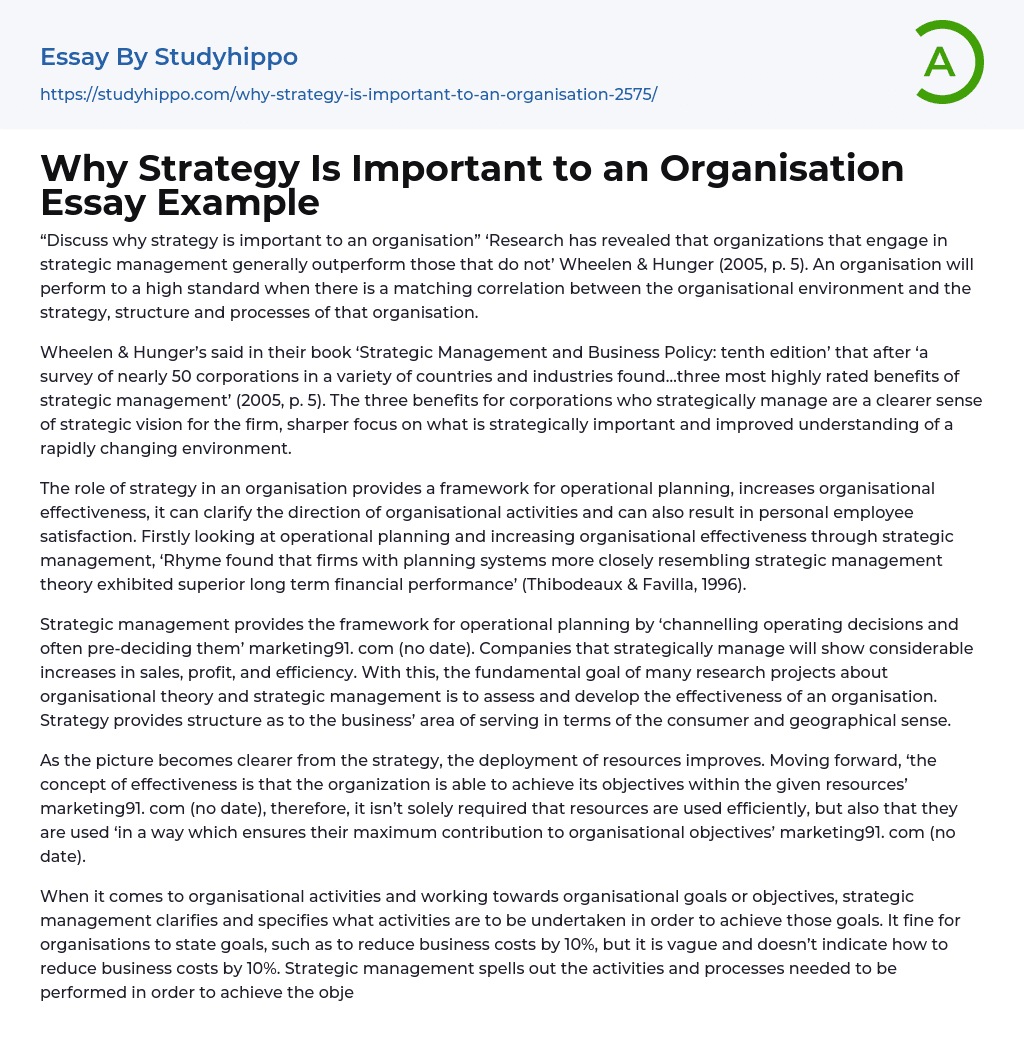

Why Strategy Is Important to an Organisation Essay Example
“Discuss why strategy is important to an organisation” ‘Research has revealed that organizations that engage in strategic management generally outperform those that do not’ Wheelen & Hunger (2005, p. 5). An organisation will perform to a high standard when there is a matching correlation between the organisational environment and the strategy, structure and processes of that organisation.
Wheelen & Hunger’s said in their book ‘Strategic Management and Business Policy: tenth edition’ that after ‘a survey of nearly 50 corporations in a variety of countries and industries found…three most highly rated benefits of strategic management’ (2005, p. 5). The three benefits for corporations who strategically manage are a clearer sense of strategic vision for the firm, sharper focus on what is strategically important and improved understanding of a rapidly changing environment.
The role of strategy in an organisation provides a framework for operational planning, increases organisational
...effectiveness, it can clarify the direction of organisational activities and can also result in personal employee satisfaction. Firstly looking at operational planning and increasing organisational effectiveness through strategic management, ‘Rhyme found that firms with planning systems more closely resembling strategic management theory exhibited superior long term financial performance’ (Thibodeaux & Favilla, 1996).
Strategic management provides the framework for operational planning by ‘channelling operating decisions and often pre-deciding them’ marketing91. com (no date). Companies that strategically manage will show considerable increases in sales, profit, and efficiency. With this, the fundamental goal of many research projects about organisational theory and strategic management is to assess and develop the effectiveness of an organisation. Strategy provides structure as to the business’ area of serving in terms of the consumer and geographical sense.
As the picture becomes clearer from
the strategy, the deployment of resources improves. Moving forward, ‘the concept of effectiveness is that the organization is able to achieve its objectives within the given resources’ marketing91. com (no date), therefore, it isn’t solely required that resources are used efficiently, but also that they are used ‘in a way which ensures their maximum contribution to organisational objectives’ marketing91. com (no date).
When it comes to organisational activities and working towards organisational goals or objectives, strategic management clarifies and specifies what activities are to be undertaken in order to achieve those goals. It fine for organisations to state goals, such as to reduce business costs by 10%, but it is vague and doesn’t indicate how to reduce business costs by 10%. Strategic management spells out the activities and processes needed to be performed in order to achieve the objective.
If employees know the direction of the organisation and know what is to be done, then employee and organisational performance will improve as a result. This also links in to the final point I made earlier that strategic management leads to employee satisfaction. When employees know precisely what to do, their performance, morale and work ethic will improve accordingly, as employees will feel more appreciated when they themselves feel that they are contributing to achieving organisational objectives, with this showing why strategy is so important to an organisation.
Page Word Count:493 (minus title, name, ID number, course code and references) References: Wheelen, T. & Hunger, J. (2005) Strategic Management and Business Policy Tenth Edition. New Jersey, USA: Pearson Prentice Hall. Thibodeaux, M. & Favilla, E. (1996) “Organisational effectiveness and commitment through strategic management” Industrial Management and Data Systems. Pages
21-25. No author (last updated Feb 6th 2012) marketing91. com, Available at: http://www. marketing91. com/role-of-strategy/ Accessed: Feb 6th 2012
- Being A Leader essays
- Servant Leadership essays
- Leadership Experience essays
- Leadership Qualities essays
- Board Of Directors essays
- Brand Management essays
- Business Ethics essays
- Business Management essays
- Change Management essays
- Comparative Analysis essays
- Decision Making essays
- Dispute Resolution essays
- Knowledge Management essays
- Leadership essays
- Leadership and Management essays
- Manager essays
- Operations Management essays
- Performance Management essays
- Product Management essays
- Project Management essays
- Quality Management essays
- Risk essays
- Risk Management essays
- Scientific Management essays
- Stress Management essays
- supply chain management essays
- Time Management essays
- Total Quality Management essays
- Business Analysis essays
- Business Plan essays
- Community Development essays
- Competition essays
- Effective Leadership essays
- Leadership Styles essays
- Mission Statement essays
- Negotiation essays
- Outsourcing essays
- Planning essays
- Public relations essays
- Reasoning essays
- Strategic Management essays
- Strategic Planning essays
- Swot Analysis essays



